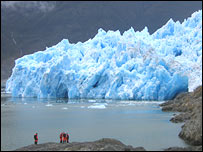
Many ice bodies from the poles to the tropics are in retreat
|
Climate scientists are puzzled over the possible significance of rising levels of atmospheric carbon dioxide (CO2).
Some think a recent acceleration in CO2 increases could be a sign of imminent, rapid global warming.
But others say the evidence of just two years is inconclusive, and suspect that natural causes are likelier culprits.
The UK government's chief scientific adviser, Sir David King, says the rise appears on the evidence so far to be an aberration, not the start of a trend.
Carbon dioxide is the main gas given off by human activities (including the burning of fossil fuels, and deforestation) which scientists believe is exacerbating natural climate change.
In recent years, the amount of atmospheric CO2 has increased by an average of 1.5 parts per million (ppm) each year, as more greenhouse gases are emitted.
But measurements at the Mauna Loa observatory in Hawaii have shown that in 2002 and 2003 the increase was more than two ppm.
The observatory, operated by the US National Oceanic and Atmospheric Administration (Noaa), has measured CO2 levels continuously for almost half a century.
 |
MAUNA LOA CO2 DATA
1993: 357.04 ppm
1994: 358.88 ppm
1995: 360.88 ppm
1996: 362.64 ppm
1997: 363.76 ppm
1998: 366.63 ppm
1999: 368.31 ppm
2000: 369.48 ppm
2001: 371.02 ppm
2002: 373.10 ppm
2003: 375.64 ppm
The mean for the 12 months of each year
|
Last March it reported that it had measured them at 379 ppm
Natural events are known to cause CO2 levels to fluctuate. One example is the periodic El Niņo weather pattern in the South Pacific, which lets the oceans emit rather than absorb carbon.
But there was no strong El Niņo effect in 2002 and 2003, prompting some scientists to speculate that the Earth's systems are becoming less able to absorb CO2.
If they are right, that could mean the onset of upsets predicted in a warming climate - melting ice, sea-level rise, and chaotic weather - could happen much sooner than expected.
But several British scientists are urging caution before anyone leaps to such apocalyptic conclusions.
Sir David told BBC News the 2 ppm rise of the last two years is "likely to be an anomaly, which would not be unprecedented, and not the start of a trend, unless it is proved otherwise".
Dr Peter Cox heads the carbon cycle group at the UK Met Office's Hadley Centre for Climate Prediction and Research.
He said the increase in CO2 was not uniform across the globe, and suspected something unusual had happened in the Northern Hemisphere.
Dr Cox suggested Europe's very hot 2003 summer and a larger than usual number of forest fires could have killed off vegetation and increased carbon releases from the soil.
He too was cautious about interpreting the Mauna Loa data, and said it was possible to read too much into two years' figures.
Dr David Hofmann, of Noaa, told the Guardian newspaper on Monday: "I don't think an increase of 2 ppm for two years in a row is highly significant - there are climatic perturbations that can make this occur.
"But the absence of a known climatic event does make these years unusual... I would say it was too soon to say that a new trend has been established, but it warrants close scrutiny."

